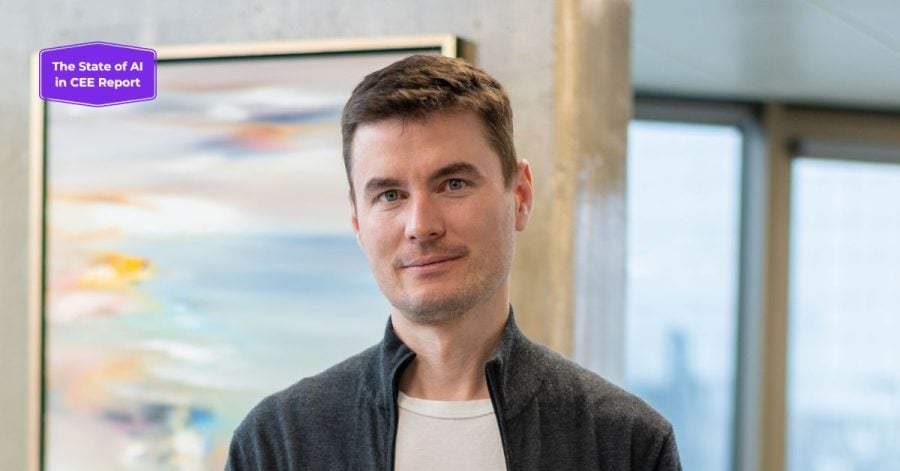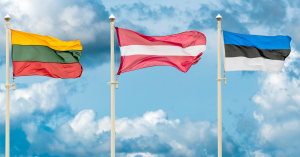Data processing, enhancing civil defense and situational awareness about natural disasters – the potential that AI has is vast and already making a difference in many industries, EndroSat’s founder and CEO Raycho Raychev explains.
In an interview with The Recursive, Raychev also discusses EnduroSat’s current and future plans, the development of spacetech, Bulgaria’s AI talent pool and more.
The following interview was conducted as a part of The Recursive’s “State of AI in CEE” report. Download the full report with insights from 40+ experts and an analysis of 900 AI product companies from CEE here.
The Recursive: Can you share what were the biggest milestones EnduroSat has achieved in the past year and what are some of the biggest challenges that your company has faced during the development of your products?
Raycho Raychev: The last year has been very challenging for all space companies in general. A lot of our competitors were forced to scale down their development and growth. In this context, we are exceptionally proud to have been able to sign and start working on our largest and most exciting projects yet.
We submitted the filing for the first Bulgarian satellite constellation. More than 120 NanoSats will provide the Balkans and the EU with unprecedented service, revisit time, monitoring capability, and AI-powered analytics. The provided space data will improve maritime surveillance, civil security, and humanitarian and environmental monitoring.
Together with Vyoma we also started building Europe’s first commercial mission for in-situ space situational awareness (SSA). EnduroSat will design and build the ESPA microsatellites that are to be launched in 2024, as part of a 12-satellite constellation.
Just recently we also launched our unique development platform – DeskSat. The DeskSat enables space engineers to develop and test their space solutions much faster. It streamlines the mission design and integration, accelerating the time to orbit. This results in significant cost optimization for every mission and lowers the complexity.
What are currently your main markets to sell your products? And what are your company’s plans for product and business development in the next 12-24 months?
Our prime markets are the US and EU. We have been helping customers put systems and entire satellites in orbit at an accelerated pace. Our prime customers are commercial space players, but also we are proud to support tens of universities, space agencies, and most interestingly – non-traditional space players.
What are the current challenges or pain points in the spacetech industry that AI can address or solve?
The space industry has been growing at a tremendous rate for the last few years. This is even more true when it comes to Earth observation data. The amount of data downlinked from satellites is so large that processing it becomes an ever bigger challenge.
AI has an absolutely crucial role in automating the processing of data and extracting useful information from it. It will greatly affect areas of civil defense, especially when it comes to immediate situational awareness during natural disasters like fires, flooding, and earthquakes. AI is vital for detecting long-term trends in climate changes based on continuous observation. Industries like agriculture and insurance depend on AI for their operations and planning.
How do you think the upcoming EU AI regulatory framework will impact the adoption of AI products and services? Are there any specific implications for the spacetech industry?
The recent boom of AI-assisted technologies has come as a bit of a shock for a lot of people and the world as a whole was not completely prepared for it. The EU AI framework aims to address the very valid concerns related to ethics, transparency, accountability, and potential biases in AI systems. As such, these frameworks are absolutely crucial for the safe and sustainable adoption of AI at scale. There is always a finite balance between regulation and innovation. If regulations become too heavy and are not taking into account the industry’s reality, they just add an additional burden on the development of new products and services, making the EU less competitive and less commercially successful.
It is vital for the EU Commission to have a meaningful conversation with EU-leading AI companies and organizations to ensure that the net result of any regulation will be positive. When it comes to the spacetech industry, the challenges remain the same. Again such frameworks need to safeguard against unsafe or unethical use of sensitive data but we must ensure that the progress of innovation is not jeopardized because of unreasonable regulations.
Which are the current drivers of the European spacetech industry in your view and what kind of initiatives can further boost its growth?
I can only speculate on a border EU-level, since I don’t have enough oversight of the entire industry. The space industry in the EU is still heavy-dependent on grants and a lot of EU space companies are not looking at the global market or are not incentivized to actually compete with their products and services. Once a company is used to surviving on grants it is really difficult to focus on competitive products, on speed of delivery and on quality. I believe that the EU must have a much more open market approach to space and must enable the EU-space industry to compete on a fair and square level. Lobbying still plays a strong role in Europe.
My gut is that the current trends in the EU are focused on better and more streamlined satellite tech and services and in small rocket developments. Downstream services are also finally getting meaningful traction.
The EU private space industry has demonstrated that it can take the lead, especially when it comes to spacetech. ESA seems to be aware of this and is actually starting to support the private sector through joint programs and cooperation. I hope they make it faster and on a larger scale.
How would you evaluate the availability and quality of talent with the necessary AI skills in Bulgaria/in the region? Which are those necessary skills that businesses like yours are looking for? What type of expertise is currently the most difficult to find?
The pool of AI talent in Bulgaria and the region has been growing and evolving quite well in the last few years but it is still a niche and small market. When it comes to the space industry, the most important AI-related professionals that we are looking for are machine learning, computer vision, and data analytics.
How do Bulgaria’s educational institutions and universities contribute to the talent pool for AI professionals?
The Bulgarian government has made a significant effort in the last years by investing a lot in AI via the INSAIT institute and other initiatives. By providing multimillion EUR support to such initiatives, financed by taxpayers, Bulgaria hopes to create a vibrant new industry and achieve real commercial return on investment. I am an optimist and I will be excited to see the actual positive outcome in terms of AI jobs created, commercially viable products and next-gen AI initiatives.
Educational institutions have made efforts to nurture the AI talent pool through educational programs and research initiatives. These efforts have led to an increase of the number of AI professionals. There is a lot more that can be done of course. It is important for the industry to guide universities and institutes to develop programs that match what the private sector is looking for.








